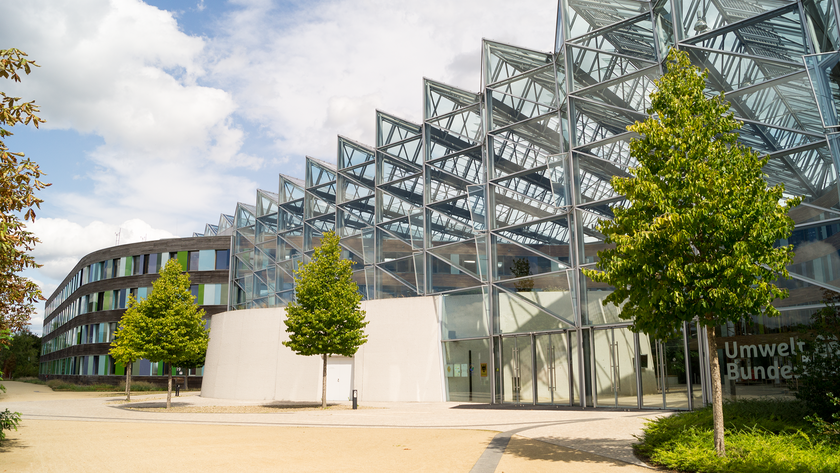Forest dieback and red rivers: F-Gas policy expert Daniel de Graaf (UBA) shares some childhood memories about why he personally cares about the environment and how he contributes to climate action in the cooling sector today.
Researching environmental risks and finding viable solutions, advising policy-makers and informing the public, as well as implementing German environmental law: the Federal Environment Agency (UBA) is the central scientific environmental protection agency under the Federal Ministry for the Environment, Nature Conservation and Nuclear Safety (BMU) in Germany, with experts from a wide range of ecological fields. Since 1974, the UBA has been working on a broad spectrum of issues such as climate protection, waste avoidance or pesticide approval. This also includes the HFC-phase down.
The UBA promotes the transition to Green Cooling not only nationwide, but also beyond the country’s borders. It provides support to international policy makers and thereby assists developing and emerging countries in their efforts within the framework of the Montreal Protocol and Kigali Amendment. We spoke to Daniel de Graaf, GCI network member and F-Gas Policy Expert at UBA, about the ideal RAC sector and what drives him personally to make this vision a reality.
Mr. de Graaf, what is your academic background and how long have you been working in this field?
After my graduation in Biochemistry in 2008, I started working on alternatives to fluorinated greenhouse gases in products and processes with a focus on hydrofluorocarbon refrigerants at the German Environment Agency (UBA). So, it is more than ten years now that I am seeking for technologies and equipment especially in the field of stationary air conditioning which avoid the use of halogenated greenhouse gases such as HFCs.
Why do you personally care about the environment?
I am a child of the 1980ies when environmental issues such as ‘Waldsterben’ (forest dieback), the problems with nuclear power and polluted rivers were discussed broadly in public. Back in 1986, I indirectly witnessed an incident at the Swiss chemical company Sandoz. As a result, the river Rhine, running past my hometown, was coloured red. As a ten-year-old, this came as a shock to me. There were plenty of such incidents at that time. They revealed that our western way of life has been threatening the biosphere and ourselves being part of it. However, there has also been hope that we can do something about it, that there are alternatives which enables our civilization to live in a sustainable way. For example, by replacing nuclear and coal power with renewable energies.
Truth be told: Mr. de Graaf, do you have a climate friendly air conditioning at home?
In theory yes, I can cool my apartment with water, chilled via the geothermal probe of a heat pump. But I never use it since it cools the floor. This is not very comfortable when you walk barefoot at home in the summer season. So even during the very hot summer of 2018 in Germany, my family and I kept our apartment cool by opening the windows at night and having the blinds down and windows shut during the day.
What is your motivation to support the dissemination of Green Cooling?
Limiting global warming to 1.5 °C compared to pre-industrial levels plays the key role in sustaining our livelihoods. It may sound dramatic, but it is a question of whether there will still be a highly organised human society of billions as we know it today in the 22nd century or just a few dispersed bunches of people struggling hard to survive on the last patches on earth that are not completely devasted by droughts, desertification, floods and other consequences of man-made climate change exceeding tipping points decades before.
Cool Talks: What are they?
In our "Cool Talks" interview series, members of the Green Cooling Initiative Network share their vision of Green Cooling. The GCI Network is an alliance of key players in the refrigeration, air-conditioning & foam sector. It comprises government institutions, international organisations and the private sector. They are united on one goal: the transformation of the cooling sector – for the benefit of people, the environment, and our shared future.
I am happy and blessed that in my professional position, I can contribute to making refrigeration and air conditioning more climate-friendly in order to avoid getting past those tipping points. Being successful or not in this regard as mankind is one of the most interesting questions of our time. I will leave it to you to judge whether ‘living in interesting times’, is something intriguing or rather a curse.
What would an ideal RAC sector look like in the future?
An ideal, future-proof RAC sector would lower the cooling needs through construction measures (e.g. shading, green roofs and facades, good insulation), satisfy its energy demand with renewable energies and use only halogen-free, natural refrigerants.
Mr. de Graaf, you have been working in this field for quite a while now. Where do you see the biggest obstacle for Green Cooling at the moment?
As a colleague in the field put it very nicely during a conference, the biggest problem for Green Cooling with natural refrigerants is that such substances are no business case for the ‘chemical brothers’. When having worked out all aspects such as cost, safety, training, etc., the only aspect left is the industry’s interest in producing and selling halogenated refrigerants such as HFCs and HFOs. They want to make their profits - like before with CFCs and HCFCs.

How does the work of the German Federal Environment Agency (UBA) contribute to more sustainable cooling worldwide?
We as a scientific agency provide German and international policy makers with the knowledge they need to take the right decisions for making the cooling sector more sustainable. But our work also comes into play in very tangible projects such as consulting our technical services unit when it is up to procuring a new chiller for one of the UBA buildings – with natural refrigerants, of course!
Please complete...
What makes me proud about my job is...
"that I can work at the UBA as an 'advocate for the environment' for the sake of health and well-being of us all."
The most rewarding experience in promoting Green Cooling was…
"that all our scientific and consultancy work led to tangible air conditioning and refrigeration projects."
What makes me optimistic that we will master the transition to Green Cooling around the world is…
"the many good examples with natural refrigerant plants and appliances which show that halogenated agents can be replaced with energy efficiency benefits."

